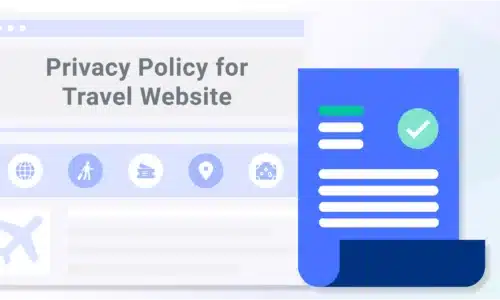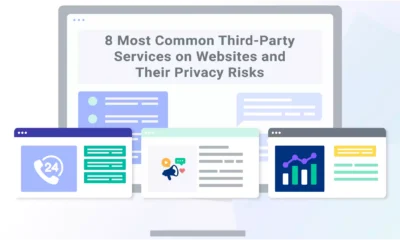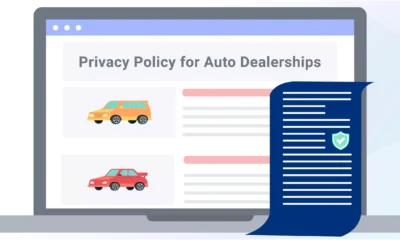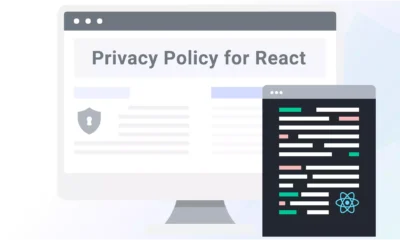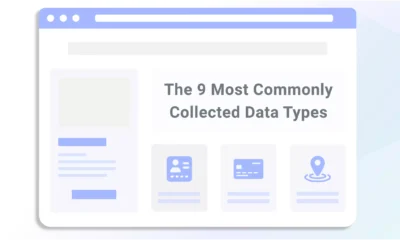Travel bloggers may be legally required to have a privacy policy if you collect email addresses for newsletters, use internet cookies for ads or analytics, or collect personal data in other ways.
Below, I explain more about why travel websites need privacy policies, what goes into them, and how to easily make one for your site.
- How To Make a Travel Site Privacy Policy
- What Is a Privacy Policy?
- Which Privacy Laws Affect Travel Websites?
- Does Your Travel Website Legally Need a Privacy Policy?
- What Are the Benefits of Having a Privacy Policy on Your Travel Website?
- What Should You Include in Your Travel Website’s Privacy Policy?
- Where To Display Your Travel Site’s Privacy Policy
- Summary
How To Make a Travel Site Privacy Policy
To start, let’s discuss how to make a privacy policy for your travel website.
Use a Privacy Policy Generator
The fastest, easiest way to make a privacy policy for your travel website is to use Termly’s free privacy policy generator.
It includes provisions to help you meet the requirements of different data privacy laws, and it’s vetted by our legal team of privacy experts who update it regularly to account for new legislation.
The generator asks simple questions about your business and its data processing activities, then makes a unique policy based on your answers.
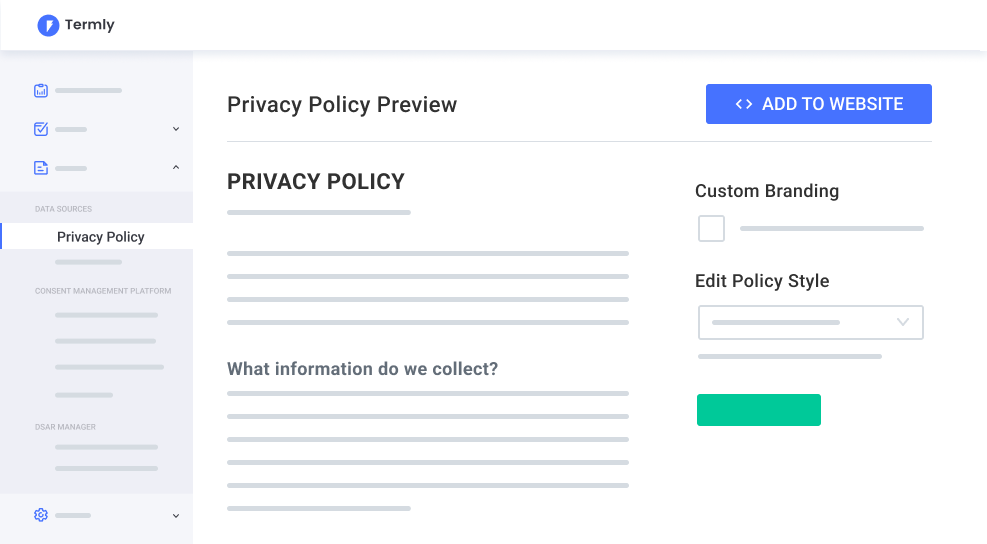
Not only are our solutions legally backed, but Termly is also committed to protecting the privacy of our users.
With Termly, you get a privacy partner you can genuinely trust.
Use a Privacy Policy Template
You also have the option to use our free privacy policy template, which is ideal for a travel website that doesn’t collect any personal data or that collects only minimal amounts.
The template is formatted for you and includes standard clauses and language to help you meet several data privacy laws.
Just fill in the blank section manually with details about your business and delete any unnecessary clauses or add new ones as needed.
Write Your Privacy Policy
You can also write a privacy policy on your own, but you must have adequate legal and technical knowledge.
It’s easy to accidentally leave something out, especially if you aren’t familiar with data privacy laws, which could put your travel website at risk.
If you decide to use this method, check out our comprehensive guide on how to write a privacy policy in nine steps for more help.
What Is a Privacy Policy?
A privacy policy explains to your website visitors that your site collects personal information and provides them with details about:
- What personal data you collect
- How the information is collected
- Why you collect the data (aka, your legal basis)
- If you share or sell it to any third parties
- What rights users have over their personal data
- How those users can act on their rights
Website owners are often legally required to have one, plus users expect to find one on your website, as it shows transparency and increases trust.
Which Privacy Laws Affect Travel Websites?
Depending on your personal data processing activities, several different privacy laws may apply to your business, including the following:
- General Data Protection Regulation (GDPR)
- California Consumer Privacy Act (CCPA)
- California Online Privacy Protection Act (CalOPPA)
- Children’s Online Privacy Protection Act (COPPA)
- Colorado Privacy Act (CPA)
- Virginia Consumer Data Protection Act (VCDPA)
Additionally, third-party platforms or services you use may require a privacy policy, like Google’s ad publisher products.
Does Your Travel Website Legally Need a Privacy Policy?
Your website legally needs a privacy policy if you use any ad publisher products or collect personal information from visitors and meet the threshold of any data privacy laws.
Because privacy laws typically apply to sites that collect personal data from users in a protected area, they may apply to you even if you’re headquartered in another state or country.
While some laws have monetary and data thresholds, like the:
- CCPA
- CPA
- CTDPA
- VCDPA
But others don’t, including CalOPPA and the GDPR.
Unless your website consists only of your personal experiences and you know nothing about who visits it, you should err on the side of caution and post one.
What Are the Benefits of Having a Privacy Policy on Your Travel Website?
Putting a privacy policy on your travel website can benefit your business in multiple ways, and legal compliance is only one example.
Legal Compliance
A privacy policy ensures you align your business with data privacy laws that might apply to your travel site.
Remember, CalOPPA and the GDPR apply based on whether you have visitors from the protracted regions and track their data or if you run your business in those regions.
If a user complains that they think you’re wrongfully collecting their data, these laws hold you financially accountable, even if you made the violation accidentally.
Boosts Business Reputation
Posting a privacy policy makes your website look more professional and secure, which helps boost your reputation.
Even if you don’t collect user information, linking to a policy that says as much keeps your visitors informed and prevents them from falsely assuming you’re secretly collecting their data.
Enhances Consumer Trust
When users can easily find your privacy policy, it increases their confidence in your site and makes them more likely to share their email to access a newsletter or click on a referral link.
Building this type of trust with your users is imperative, as it helps maintain readers and encourages people to return to your site or blog.
Improved Coordination With Third-Party Apps
Many third-party apps and platforms, like Google AdSense and Google Analytics, require users to post a privacy policy.
If your travel site wants to use any of these features, you’ll need a privacy policy that meets the guidelines they outline in their terms of use.
Better Search Engine Optimization (SEO)
Implementing search engine optimization (SEO) helps people find your travel website, and posting a privacy policy may help boost your site in the algorithms of some search engines.
Many search engines prefer to put reputable websites as top search results, and posting one shows an ethical, secure, and legal commitment to your website visitors.
What Should You Include in Your Travel Website’s Privacy Policy?
Your privacy policy should include several pieces of crucial information, which I’ll cover in detail throughout this next section.
Introduction
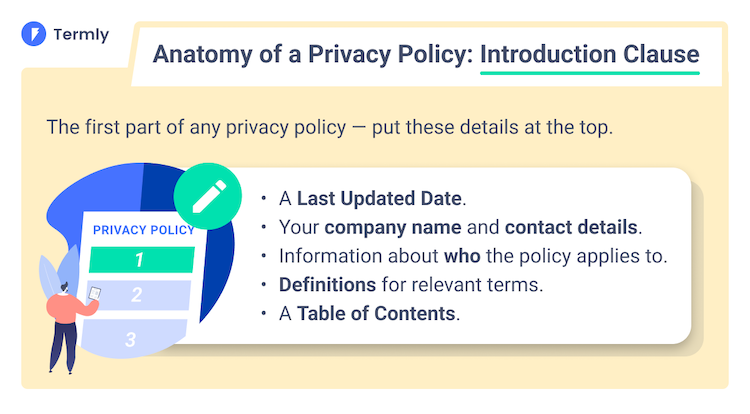
Make sure you have a well-written introduction section in your privacy policy.
It should include the full name of your business, state who the terms of the policy apply to, define applicable terms, and include a table of contents.
The Type of Data You Collect
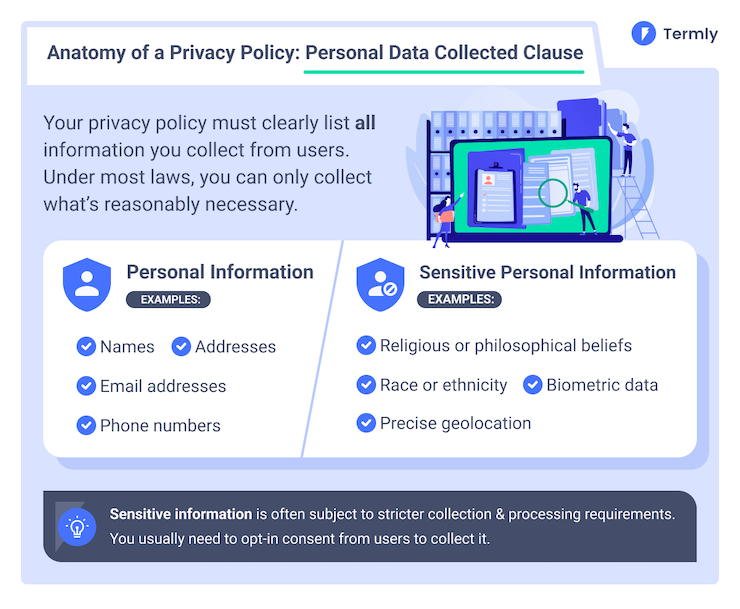
Your privacy policy should disclose all the data you collect about website visitors.
That should include the obvious, like email address and other contact information a visitor might voluntarily put into a contact form.
But your privacy policy for a travel website should also contain the less obvious data, like:
- Location tracking information
- IP addresses
- Referral sources
- Anything else you know about your visitors
Most privacy laws focus on personal information, but what each law sees as personally identifiable might surprise you.
How and Why You Use the Data
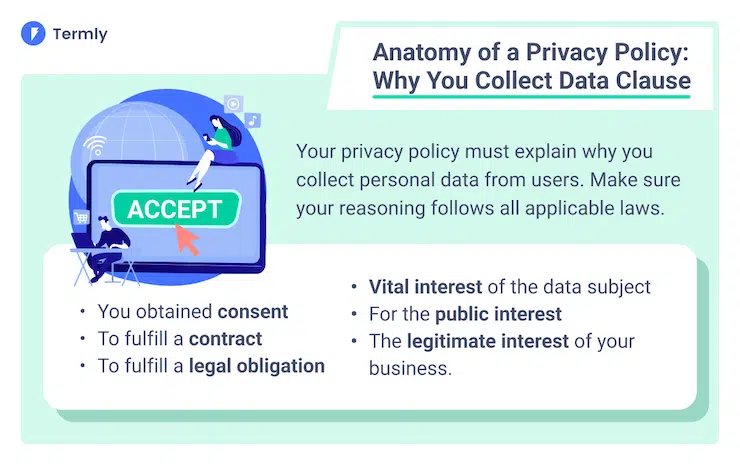
Your privacy policy should disclose how you use data and your purpose for doing so, following any applicable data privacy laws.
For example, under the GDPR, your purpose is known as your legal basis.
How you might use the data may include:
- Re-marketing to existing customers
- Providing targeted deals
- Performing internal business analysis
- Gathering aggregate information about visitor trends and interests
Whether You Collect Data From Children
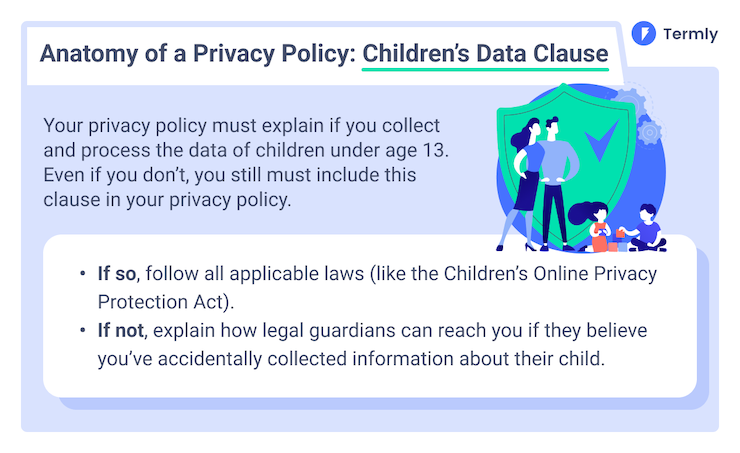
If children under age 13 visit your travel website, you must follow the strict guidelines of the U.S. Federal law, the Children’s Online Privacy Protection Act (COPPA).
Even if your travel website doesn’t include family vacations or ways to keep the kids entertained on family trips, your privacy policy should state if you don’t intend to collect children’s data.
Third-party Sharing of Data
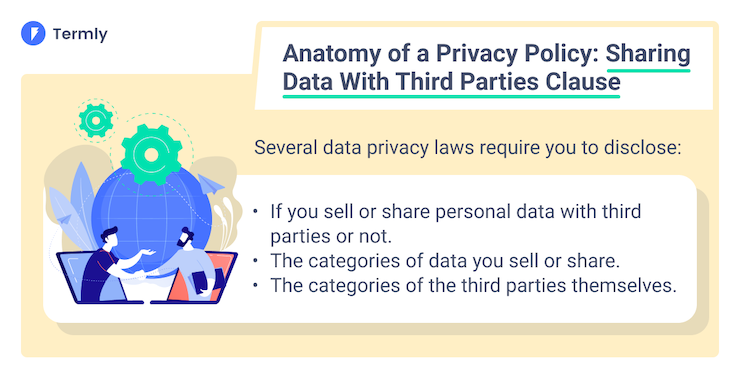
Most data privacy laws require you to tell consumers if you share or sell their personal information with any third parties.
Include a clause explaining what external entities can access the data, especially if your site performs targeted advertising or analytics.
Data Retention Policy
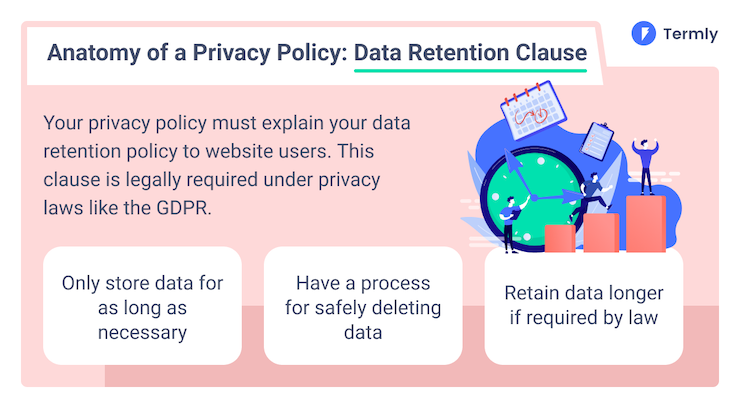
You must explain how long you plan to retain personal data for in a clause in your privacy policy, as required by laws like the GDPR.
Inform users about the process you use for determining this timeline.
How You Protect Visitor Data
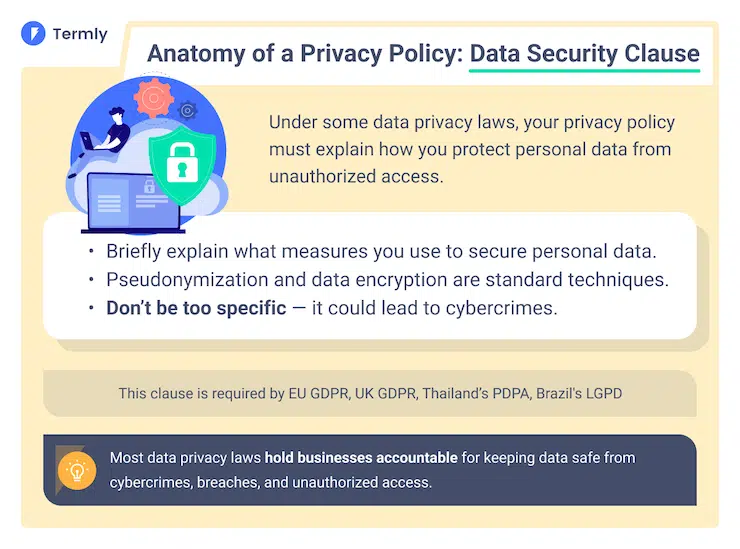
The idea behind a privacy policy might be to demonstrate transparency to users about what data you keep, but you’re also obligated to keep that information safe.
In a clause, outline the steps you take to ensure data remains private and secure, like through encryption or anonymization.
Cookies and Other Data Tracking Methods
![]()
It’s common for travel blogs and other consumer-oriented websites to use cookies that track user behavior.
For example, you might use cookies to see where your visitors came from, such as a search engine results page, and where they went on your site.
If so, disclose it in your privacy policy and include a live link to a cookie policy.
Description of Consumer Rights Over Their Data
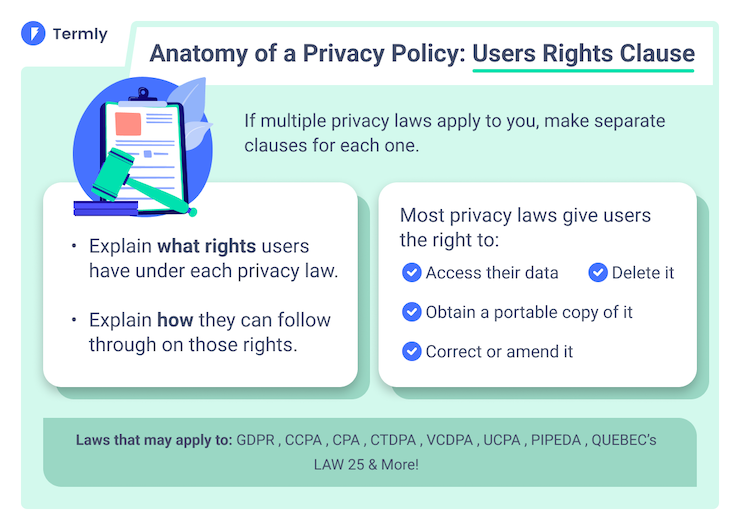
Many data privacy laws, including the VCDPA, CPA, and CCPA, require you to explain what rights consumers have over their data and how to follow through on them.
You must include these details in your privacy policy.
Consider adding a section for users based in different locations so they can easily find the rights that apply to their specific situation.
Updates to Your Privacy Policy
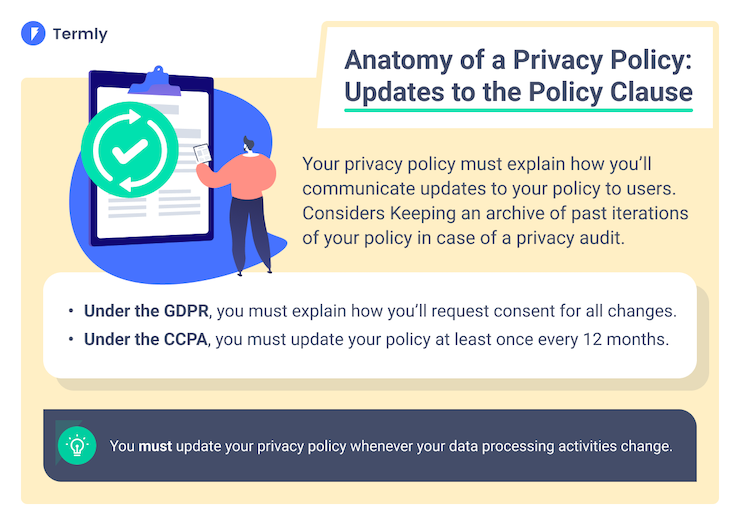
You should update your privacy policy whenever your data collection processes change or evolve so it’s always accurate and up to date.
Under laws like the CCPA, you must update your policy at least once every 12 months.
Ensure your privacy policy has a last updated date at the top, as laws require one, and consider keeping an archive of older versions of your policy.
International Data Transfers
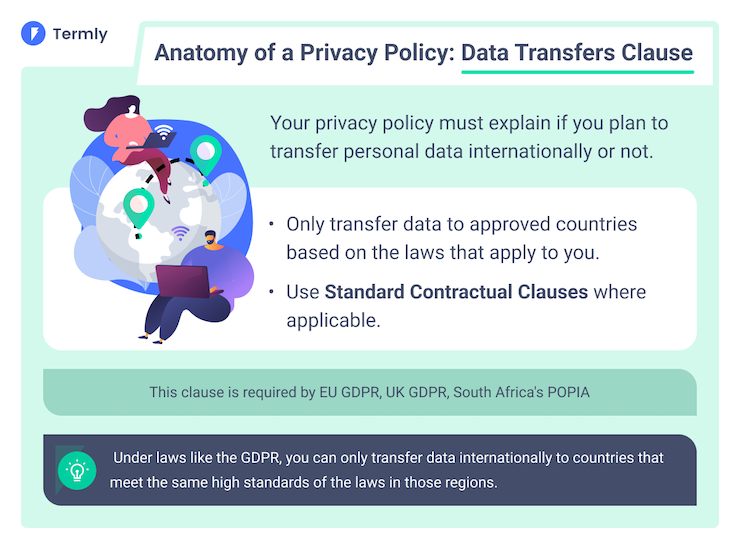
Laws like the GDPR require you to disclose in your privacy policy if you intend to transfer collected data internationally.
Ensure you’re only transferring data to locations with equal levels of privacy protections in place as the laws that apply to your business and users.
Company Contact Information
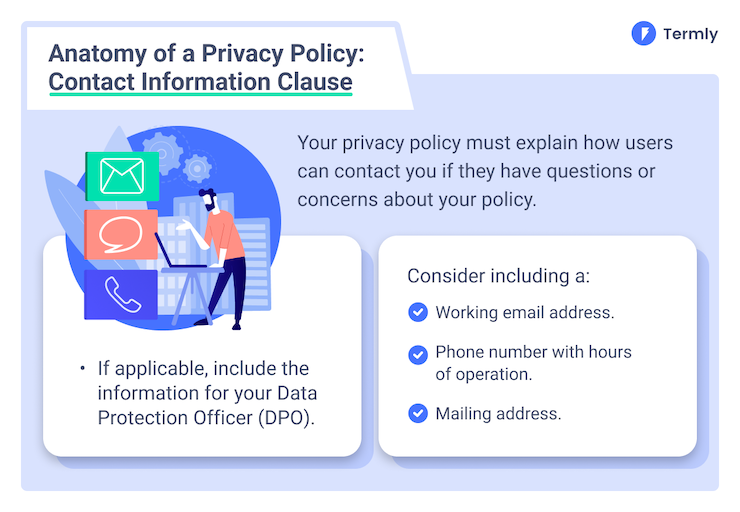
Add a clause to your travel site’s privacy policy that includes your company contact information.
You can direct users about how to contact you if they have any questions, comments, or concerns regarding your policy.
Where To Display Your Travel Site’s Privacy Policy
Once you’ve created your privacy policy, you should put it in multiple spots throughout your travel site to ensure your consumers can always access it.
I recommend linking it in all of the following spots:
- In your website footer. This static place on your site ensures users can access it on every page they browse.
- On new user account creation pages. If your website allows users to make logins or profiles, link to your policy since data collection often occurs here.
- On payment screens. If your site sells any goods or services, link to your policy to let users read it before making a purchase.
- On marketing email or newsletter forms. Many travel sites send newsletters, and emails and names are considered personal data under privacy laws.
- Anywhere else data collection occurs. If you fall under the GDPR, you must present a privacy notice to users wherever data collection occurs.
Summary
A privacy policy is necessary for your travel website if you collect user data through payments, data tracking, or other methods.
If you don’t post one, you risk repercussions like legal trouble and losing client trust.
You can easily make a comprehensive privacy policy for your travel website using our Privacy Policy Generator.
Reviewed by Masha Komnenic CIPP/E, CIPM, CIPT, FIP Director of Global Privacy


